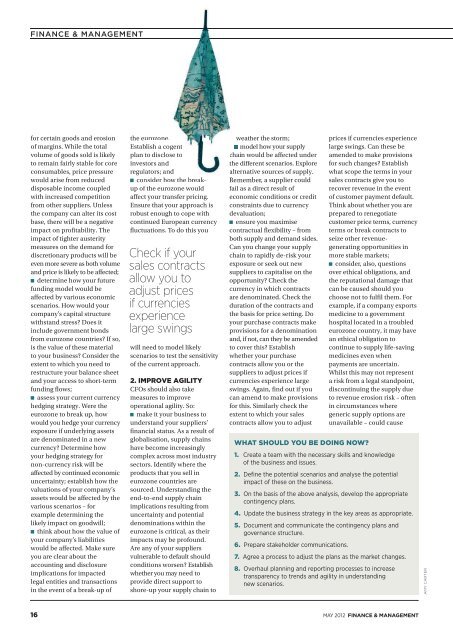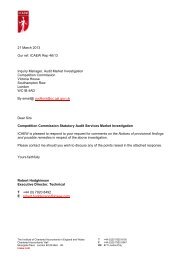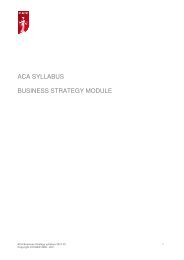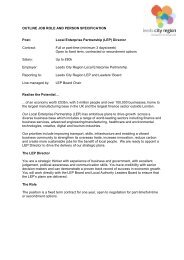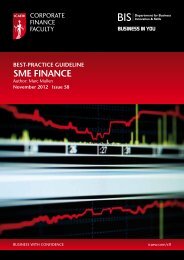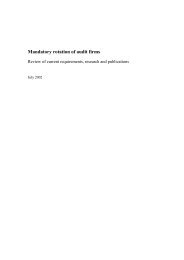Hit the road Positive leadership for troubled times - ICAEW
Hit the road Positive leadership for troubled times - ICAEW
Hit the road Positive leadership for troubled times - ICAEW
Create successful ePaper yourself
Turn your PDF publications into a flip-book with our unique Google optimized e-Paper software.
FINANCE & MANAGEMENT<br />
<strong>for</strong> certain goods and erosion<br />
of margins. While <strong>the</strong> total<br />
volume of goods sold is likely<br />
to remain fairly stable <strong>for</strong> core<br />
consumables, price pressure<br />
would arise from reduced<br />
disposable income coupled<br />
with increased competition<br />
from o<strong>the</strong>r suppliers. Unless<br />
<strong>the</strong> company can alter its cost<br />
base, <strong>the</strong>re will be a negative<br />
impact on profitability. The<br />
impact of tighter austerity<br />
measures on <strong>the</strong> demand <strong>for</strong><br />
discretionary products will be<br />
even more severe as both volume<br />
and price is likely to be affected;<br />
determine how your future<br />
funding model would be<br />
affected by various economic<br />
scenarios. How would your<br />
company’s capital structure<br />
withstand stress? Does it<br />
include government bonds<br />
from eurozone countries? If so,<br />
is <strong>the</strong> value of <strong>the</strong>se material<br />
to your business? Consider <strong>the</strong><br />
extent to which you need to<br />
restructure your balance sheet<br />
and your access to short-term<br />
funding flows;<br />
assess your current currency<br />
hedging strategy. Were <strong>the</strong><br />
eurozone to break up, how<br />
would you hedge your currency<br />
exposure if underlying assets<br />
are denominated in a new<br />
currency? Determine how<br />
your hedging strategy <strong>for</strong><br />
non-currency risk will be<br />
affected by continued economic<br />
uncertainty; establish how <strong>the</strong><br />
valuations of your company’s<br />
assets would be affected by <strong>the</strong><br />
various scenarios – <strong>for</strong><br />
example determining <strong>the</strong><br />
likely impact on goodwill;<br />
think about how <strong>the</strong> value of<br />
your company’s liabilities<br />
would be affected. Make sure<br />
you are clear about <strong>the</strong><br />
accounting and disclosure<br />
implications <strong>for</strong> impacted<br />
legal entities and transactions<br />
in <strong>the</strong> event of a break-up of<br />
<strong>the</strong> eurozone.<br />
Establish a cogent<br />
plan to disclose to<br />
investors and<br />
regulators; and<br />
consider how <strong>the</strong> breakup<br />
of <strong>the</strong> eurozone would<br />
affect your transfer pricing.<br />
Ensure that your approach is<br />
robust enough to cope with<br />
continued European currency<br />
fluctuations. To do this you<br />
Check if your<br />
sales contracts<br />
allow you to<br />
adjust prices<br />
if currencies<br />
experience<br />
large swings<br />
will need to model likely<br />
scenarios to test <strong>the</strong> sensitivity<br />
of <strong>the</strong> current approach.<br />
2. IMPROVE AGILITY<br />
CFOs should also take<br />
measures to improve<br />
operational agility. So:<br />
make it your business to<br />
understand your suppliers’<br />
financial status. As a result of<br />
globalisation, supply chains<br />
have become increasingly<br />
complex across most industry<br />
sectors. Identify where <strong>the</strong><br />
products that you sell in<br />
eurozone countries are<br />
sourced. Understanding <strong>the</strong><br />
end-to-end supply chain<br />
implications resulting from<br />
uncertainty and potential<br />
denominations within <strong>the</strong><br />
eurozone is critical, as <strong>the</strong>ir<br />
impacts may be profound.<br />
Are any of your suppliers<br />
vulnerable to default should<br />
conditions worsen? Establish<br />
whe<strong>the</strong>r you may need to<br />
provide direct support to<br />
shore-up your supply chain to<br />
wea<strong>the</strong>r <strong>the</strong> storm;<br />
model how your supply<br />
chain would be affected under<br />
<strong>the</strong> different scenarios. Explore<br />
alternative sources of supply.<br />
Remember, a supplier could<br />
fail as a direct result of<br />
economic conditions or credit<br />
constraints due to currency<br />
devaluation;<br />
ensure you maximise<br />
contractual flexibility – from<br />
both supply and demand sides.<br />
Can you change your supply<br />
chain to rapidly de-risk your<br />
exposure or seek out new<br />
suppliers to capitalise on <strong>the</strong><br />
opportunity? Check <strong>the</strong><br />
currency in which contracts<br />
are denominated. Check <strong>the</strong><br />
duration of <strong>the</strong> contracts and<br />
<strong>the</strong> basis <strong>for</strong> price setting. Do<br />
your purchase contracts make<br />
provisions <strong>for</strong> a denomination<br />
and, if not, can <strong>the</strong>y be amended<br />
to cover this? Establish<br />
whe<strong>the</strong>r your purchase<br />
contracts allow you or <strong>the</strong><br />
suppliers to adjust prices if<br />
currencies experience large<br />
swings. Again, find out if you<br />
can amend to make provisions<br />
<strong>for</strong> this. Similarly check <strong>the</strong><br />
extent to which your sales<br />
contracts allow you to adjust<br />
WHAT SHOULD YOU BE DOING NOW?<br />
prices if currencies experience<br />
large swings. Can <strong>the</strong>se be<br />
amended to make provisions<br />
<strong>for</strong> such changes? Establish<br />
what scope <strong>the</strong> terms in your<br />
sales contracts give you to<br />
recover revenue in <strong>the</strong> event<br />
of customer payment default.<br />
Think about whe<strong>the</strong>r you are<br />
prepared to renegotiate<br />
customer price terms, currency<br />
terms or break contracts to<br />
seize o<strong>the</strong>r revenuegenerating<br />
opportunities in<br />
more stable markets;<br />
consider, also, questions<br />
over ethical obligations, and<br />
<strong>the</strong> reputational damage that<br />
can be caused should you<br />
choose not to fulfil <strong>the</strong>m. For<br />
example, if a company exports<br />
medicine to a government<br />
hospital located in a <strong>troubled</strong><br />
eurozone country, it may have<br />
an ethical obligation to<br />
continue to supply life-saving<br />
medicines even when<br />
payments are uncertain.<br />
Whilst this may not represent<br />
a risk from a legal standpoint,<br />
discontinuing <strong>the</strong> supply due<br />
to revenue erosion risk – often<br />
in circumstances where<br />
generic supply options are<br />
unavailable – could cause<br />
1. Create a team with <strong>the</strong> necessary skills and knowledge<br />
of <strong>the</strong> business and issues.<br />
2. Define <strong>the</strong> potential scenarios and analyse <strong>the</strong> potential<br />
impact of <strong>the</strong>se on <strong>the</strong> business.<br />
3. On <strong>the</strong> basis of <strong>the</strong> above analysis, develop <strong>the</strong> appropriate<br />
contingency plans.<br />
4. Update <strong>the</strong> business strategy in <strong>the</strong> key areas as appropriate.<br />
5. Document and communicate <strong>the</strong> contingency plans and<br />
governance structure.<br />
6. Prepare stakeholder communications.<br />
7. Agree a process to adjust <strong>the</strong> plans as <strong>the</strong> market changes.<br />
8. Overhaul planning and reporting processes to increase<br />
transparency to trends and agility in understanding<br />
new scenarios.<br />
AMY CARTER<br />
16<br />
MAY 2012 FINANCE & MANAGEMENT


